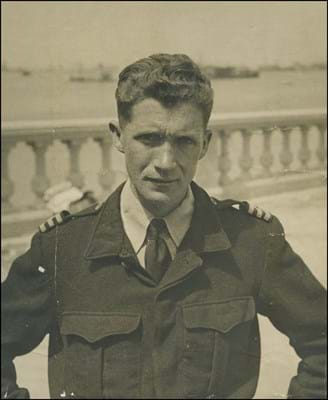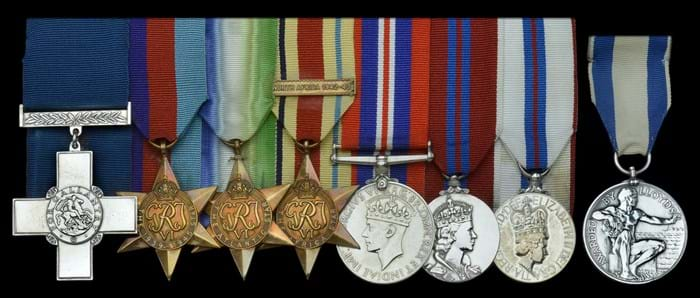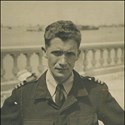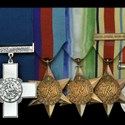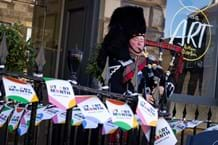The immensely important contribution of the Merchant Navy is another aspect which is sometimes left in the shadows, with the Royal Navy shining through in many accounts.
But the commercial and trading ships were vital to the war effort and the job involved huge hardships and danger: 30,248 merchant seamen lost their lives.
The risks are epitomised by a German aircraft attack on a cargo ship in a North African harbour in 1943 which led to the awarding of one of just three George Crosses to merchant seamen during that conflict.
Chief Officer George Stronach’s medal group is estimated at £120,000-140,000 in the Dix Noonan Webb auction in London on May 10.
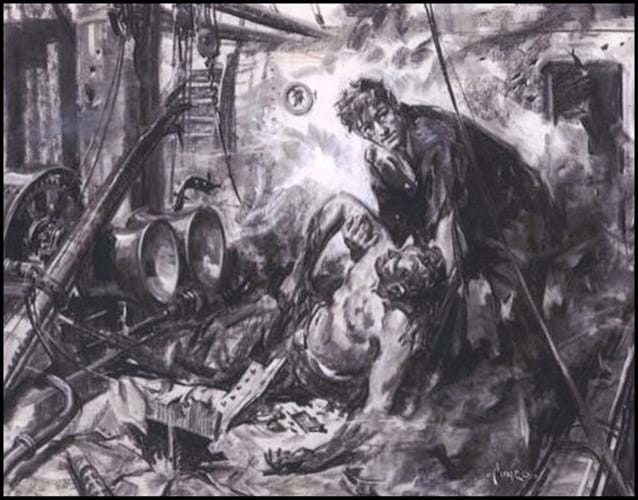
An artist’s impression of Chief Officer George Stronach winning the George Cross aboard SS Ocean Voyager in 1943 in Tripoli harbour.
The Scotsman became one of the Merchant Navy’s greatest heroes when he rescued comrades from the blazing SS Ocean Voyager, which was one of the vessels supplying the British Eighth Army as it fought its way westwards across North Africa. Tripoli was one of the army’s major supply ports.
Stronach rescued four comrades – one of who subsequently died from his injuries – amid the blazing hell of the ship, which was moored in Tripoli with thousands of tons of aviation fuel and ammunition aboard when it came under low level attack from the Luftwaffe.
Despite being knocked temporarily unconscious by a massive explosion which killed the ship’s captain, he recovered and rescued survivors as the cargo exploded, only jumping overboard when he was sure that nobody was still alive on the ship.
Amazing calmness
The GC is the highest British gallantry decoration that can be won by someone not in the armed forces.
“Stronach was a quiet, reserved Scotsman who showed amazing calmness and courage as the ammunition below decks on Ocean Voyager began to explode,” said Pierce Noonan, a DNW director.
“Realising that the ship itself was doomed, he set about rescuing as many of his injured shipmates as he could, putting their lives above his own survival. There have been few better examples of such unselfish heroism in the distinguished history of the George Cross.”
The decorations and medals are being offered for sale by Stronach’s daughter, who lives in Scotland. She said: “I am extremely proud of my father, for he was a very fine man in every way.
“I think it could be said of him, as of so many others, that he was a ‘reluctant hero’. He never spoke about the the war although I know that he never forgot it or those of his ship who were lost during the bombing raid in Tripoli. Indeed, one of his greatest wishes was to have been able to visit the Commonwealth War Graves cemetery there in order to pay his respects to his shipmates. Sadly, this was never realised.”
Rare honour
Stronach (1914-99) not only received one of just three Second World War GCs to the Merchant Navy – the other two are in museums – but also the Lloyd’s War Medal for Bravery at Sea awarded by Lloyd’s of London.
After a period in hospital recovering from a back injury sustained during the action, Stronach went back to sea before becoming a marine pilot on the Clyde. Retiring in 1979, he lived in Acharacle, Argyllshire, where he died in 1999.
Along with the GC and Lloyd’s honours, Stronach’s decorations and medals consist of:1939-45 Star, Atlantic Star, Africa Star with clasp North Africa 1942-3, War Medal 1939-45, Elizabeth II Coronation Medal 1953, Elizabeth II Silver Jubilee Medal 1977. They are accompanied by an archive of original material, including letters of gratitude from two of the men whose lives he saved.


